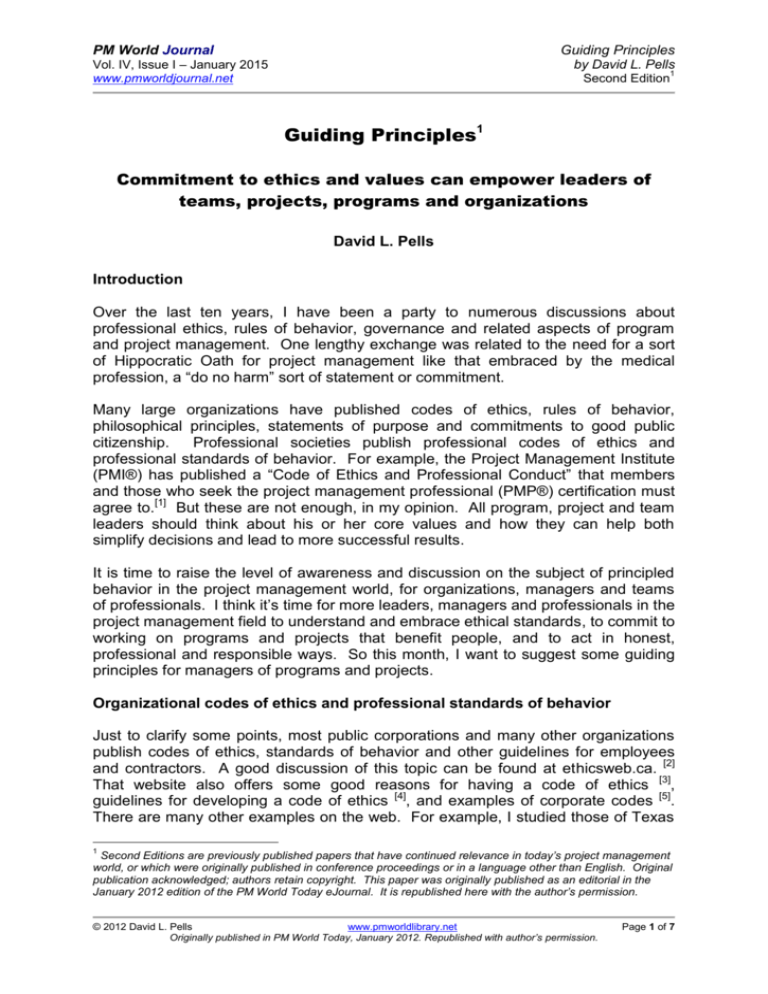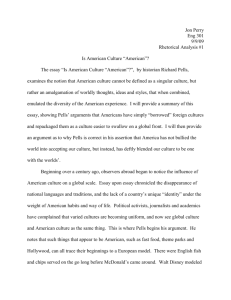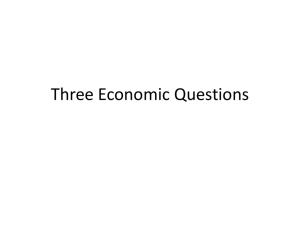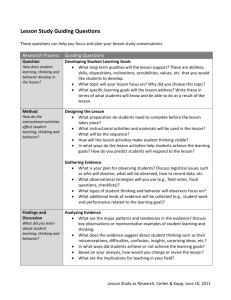- PMWorld Library
advertisement

PM World Journal Guiding Principles by David L. Pells Vol. IV, Issue I – January 2015 www.pmworldjournal.net Second Edition 1 Guiding Principles1 Commitment to ethics and values can empower leaders of teams, projects, programs and organizations David L. Pells Introduction Over the last ten years, I have been a party to numerous discussions about professional ethics, rules of behavior, governance and related aspects of program and project management. One lengthy exchange was related to the need for a sort of Hippocratic Oath for project management like that embraced by the medical profession, a “do no harm” sort of statement or commitment. Many large organizations have published codes of ethics, rules of behavior, philosophical principles, statements of purpose and commitments to good public citizenship. Professional societies publish professional codes of ethics and professional standards of behavior. For example, the Project Management Institute (PMI®) has published a “Code of Ethics and Professional Conduct” that members and those who seek the project management professional (PMP®) certification must agree to.[1] But these are not enough, in my opinion. All program, project and team leaders should think about his or her core values and how they can help both simplify decisions and lead to more successful results. It is time to raise the level of awareness and discussion on the subject of principled behavior in the project management world, for organizations, managers and teams of professionals. I think it’s time for more leaders, managers and professionals in the project management field to understand and embrace ethical standards, to commit to working on programs and projects that benefit people, and to act in honest, professional and responsible ways. So this month, I want to suggest some guiding principles for managers of programs and projects. Organizational codes of ethics and professional standards of behavior Just to clarify some points, most public corporations and many other organizations publish codes of ethics, standards of behavior and other guidelines for employees and contractors. A good discussion of this topic can be found at ethicsweb.ca. [2] That website also offers some good reasons for having a code of ethics [3], guidelines for developing a code of ethics [4], and examples of corporate codes [5]. There are many other examples on the web. For example, I studied those of Texas 1 Second Editions are previously published papers that have continued relevance in today’s project management world, or which were originally published in conference proceedings or in a language other than English. Original publication acknowledged; authors retain copyright. This paper was originally published as an editorial in the January 2012 edition of the PM World Today eJournal. It is republished here with the author’s permission. © 2012 David L. Pells www.pmworldlibrary.net Originally published in PM World Today, January 2012. Republished with author’s permission. Page 1 of 7 PM World Journal Vol. IV, Issue I – January 2015 www.pmworldjournal.net Guiding Principles by David L. Pells Second Edition 1 Instruments,[6] Halliburton,[7] Coca Cola,[8] AT&T, [9] Google, [10] and several other large US corporations. I especially like Google’s overriding principle of “don’t do evil.” Professional standards are similar to organizational codes of conduct, but are more directly aimed at personal behavior. Some good examples are the Society of Professional Journalists [11], Institute for the Certification of Computing Professionals [12] , and International Association of Business Communicators [13]. In addition to PMI, other project management professional associations with published codes of ethics include the Australian Institute of Project Management [14] and Association for Project Management in the UK [15]. The above references to organizational codes of ethics and professional codes of conduct are mentioned to provide background and contextual information. These types of codes are important for a wide variety of reasons, for guiding employee and professional behavior, to provide ethical standards, to reduce risks and to ensure compliance with laws and regulations. However, they often cover many topics, are difficult to remember in detail and often contain requirements for which compliance may be difficult to prove or even demonstrate. This paper suggests that everyone needs a simple set of guiding principles that reflect core values, that are general in nature, and that can be easily remembered and communicated. Core values AIPM mentions the following five underlying principles that underpin the institute’s Code of Professional Conduct: integrity, competency, impartiality, accountability and honesty [14]. PMI mentions four values that provide the foundation for its Code of Ethics and Professional Code: responsibility, respect, fairness and honesty.[1] APM states “Professional ethical behaviour is about doing things ‘right’ so that it complies with the norms of ethical behaviour and public interest such that it could, if necessary, withstand intense public scrutiny.” [15] Ten suggested Guiding Principles Following are some of the guiding principles that work for me. Some are easier to meet than others, but I think they are all good principles to work (and live) by. 1. Create value for, and do no harm to, other people – This goes right to the heart of project portfolio management, selecting the right projects to invest in, work on and support. Is it possible that all projects create value for other people or for society? I think that it is; unfortunately, that is not the case for many organizations and people. But if a program or project causes harm, does evil (in Google’s words), hurts others or society, it should not be financed or supported. This is also a statement in support of nonviolence. This value creates a dilemma for many professionals, since programs and projects in military and defense sectors are to create weapon systems. I would argue that as long as military programs are used for defense, then they satisfy this guiding principle. Weapons that find their way into the hands of criminals, terrorists and evil doers, however, should be destroyed. © 2012 David L. Pells www.pmworldlibrary.net Originally published in PM World Today, January 2012. Republished with author’s permission. Page 2 of 7 PM World Journal Vol. IV, Issue I – January 2015 www.pmworldjournal.net Guiding Principles by David L. Pells Second Edition 1 2. Minimize harm to the planet – This is also a dilemma, since one might argue that as long as we participate in a carbon-based economy (and many other aspects of modern life), it is impossible not to harm the environment. This is why I use the word “minimize”; we should all try to minimize our carbon footprint, minimize the negative impact of our projects, programs and organizations on the planet we live on. This principle also leads to questions about our supply chains, environmental practices and impacts of suppliers around the world. It is often difficult or even impossible to know the real or potential impact of our projects on the environment, whether in high technology (such as ICT, healthcare or aerospace) or low technology (such as agriculture). Nevertheless, I think this is an issue that everyone should now worry about. 3. Be honest: speak and act honestly at all times – The rules we give our children apply to us as adults and professionals as well: don’t lie, don’t cheat, don’t steal. Without honesty, most economic, social and political activity would collapse. We must be able to rely on information or it is worthless. Unreliable people create more problems than they are worth. Progress is limited without true and honest information, knowledge and resources. Honesty should underlie all that we say and do, write and communicate, and even think. We should always be honest with ourselves first, then with those we deal with. It’s the best way to live and work. 4. Care for stakeholders as people – true project and program leadership stems from understanding and valuing people, especially employees and customers. We often hear the saying that the most important resources on our project teams are the people. That is because humans have so much capacity for creativity, hard work and real accomplishment. But humans also have significant frailties and risks; we are subject to aging, illnesses, family and social problems, intelligence (or lack thereof), different skills, education levels, and many other characteristics. The most effective and successful program and project managers, in my opinion, are those who think most seriously about their stakeholders in very human terms – who are they? What are their personal interests and needs? What are their family situations? What are their personal feelings and roles on the project? Caring for stakeholders as human beings helps improve one’s emotional intelligence, leads to improved stakeholder relationships, reduces risks and usually produces more positive outcomes. Showing respect and sensitivity to others as human beings will produce many positive results. 5. Commit to professional standards of behavior – I take the term and concept of “professionalism” very seriously. I take pride in working to professional standards, to being considered a professional by customers and peers, and in accomplishing work in a professional manner. My involvement over the years in project management professional societies has reinforced these feelings. And I have seen very positive results, in terms of respect from others. We need to understand and value professional standards, for both outcomes and behavior. Of course, professionalism and professional standards directly © 2012 David L. Pells www.pmworldlibrary.net Originally published in PM World Today, January 2012. Republished with author’s permission. Page 3 of 7 PM World Journal Vol. IV, Issue I – January 2015 www.pmworldjournal.net Guiding Principles by David L. Pells Second Edition 1 support the other principles mentioned in this paper. Consider the codes of conduct and other benefits of membership in professional societies. 6. Obey the laws – This seems like a no brainer. But what if the laws are bad, unjust or corrupt? Reasonable, educated professionals should recognize that we must obey the laws in the countries and places where we work. Otherwise, we can be fined, jailed or hurt in many ways, and our projects damaged. This is an important message for project teams and suppliers, one that appears in literally all corporate codes of conduct. In cases where homeland laws and regulations conflict with those in another country, then we can probably not work in those second or third locations. When laws are bad, then we should work within the legal and political systems to change and improve the laws. I believe that liberal western democratic systems are preferable to others around the world, but no legal or political system is perfect. There is much injustice in the world, and in many legal systems. This is an area where we must all be very careful, so better safe than sorry! Just know and understand the applicable laws and regulations, and work within those laws. 7. Avoid conflicts of interest – Conflicts of interest may be the single biggest problem for many leaders and project professionals. This is also highlighted in most professional codes of ethics. Conflicts of interest are at the heart of much corruption and crime. On a personal level, we should avoid making decisions based on personal gain when such gains may conflict with the interests of our project, program, organization or stakeholders. Conflicts of interest in the contracting process can also lead to poor quality, bad financial results, or even criminal acts and punishment. This is also a major issue in the governance arena, at all levels, especially in public organizations. In my experience, many conflicts of interest are quite obvious to those closest to the individuals involved, especially if there is any degree of transparency or accountability. Unfortunately, conflicts of interest are often hidden through fraud or lack of transparency. Best option: avoid the problem in the first place. 8. Assume responsibility – We should all feel responsible for our own actions. In the project management field, however, we must often assume quite a lot of additional responsibility, sometimes contractually. As project or program managers, we will be responsible for a scope of work, delivery of products or outcomes, leading and managing people, dealing with stakeholders, compliance with laws and regulations, meeting deadlines, spending and accounting for money, reporting to customers, solving problems and many other things. Go with it. It comes with the job, and the profession. The best managers embrace responsibility, acknowledge successes and failures, work hard to achieve success, and are prepared to live with the results. To me this has always seemed like the best and smartest way to work, and a sign of true leadership. 9. Do a good job – One of the first and most lasting pieces of advice given to me as a young professional was to just “do a good job”. It’s the perfect guiding principle, since it forces one to (a) define and understand the job in all of its © 2012 David L. Pells www.pmworldlibrary.net Originally published in PM World Today, January 2012. Republished with author’s permission. Page 4 of 7 PM World Journal Vol. IV, Issue I – January 2015 www.pmworldjournal.net Guiding Principles by David L. Pells Second Edition 1 dimensions; (b) identify, understand and satisfy the customer; and (c) define and perform to the best quality requirements. While many people may need a little more guidance and definition, the bottom line is that we need to understand what we are doing, and whether we are qualified or need additional experience, knowledge or help; how to define quality and success; and have the motivation, energy and skill to achieve the desired results. This too seems like a good idea. 10. Commit to continuous learning, growth and maturity – I have become convinced that in the project management field, continuous learning is absolutely mandatory. Should this be a guiding principle? To me it is more like a philosophy, based on an understanding that we all have a life cycle that encompasses education, experience, growth and maturing as humans, professionals and leaders. I am smarter, more knowledgeable, more mature and wiser than I have ever been. But there is a lot that I don’t know. And now that program and project management have spread across so many industries and parts of the world, in so many different conditions, it is clear than no one can, in fact, know it all. As pointed out in my February 2010 editorial “Three good reasons for continuous learning in project management”, advanced PM cannot be learned through education or experience alone anymore. [16] This is a challenge, but also an exciting opportunity. For me, continuous learning has become an exhilarating process. Conclusion Perhaps these values will not work for everyone, or in every circumstance, organization or industry. But they seem solid to me. Of course, there are many other valuable principles that should guide our work and personal behavior. If more were committed to such guiding principles, however, I think the world would be better off. We would be working on more ethical and useful projects. And the project management profession would continue to grow in respect, influence and importance. If you have a comment related to this editorial, please send an email to me. Good luck with your projects. David L. Pells Managing Editor © 2012 David L. Pells www.pmworldlibrary.net Originally published in PM World Today, January 2012. Republished with author’s permission. Page 5 of 7 PM World Journal Vol. IV, Issue I – January 2015 www.pmworldjournal.net Guiding Principles by David L. Pells Second Edition 1 1. http://www.pmi.org/en/AboutUs/Ethics/~/media/PDF/Ethics/ap_pmicodeofethics.ashx 2. http://www.ethicsweb.ca/codes/ 3. http://www.ethicsweb.ca/codes/coe2.htm 4. http://www.ethicsweb.ca/codes/codes-macdonald.pdf 5. Examples of corporate codes of ethics http://www.ethicsweb.ca/resources/business/codes.html 6. TI Guiding Principles http://www.ti.com/corp/docs/csr/corpgov/ethics/guiding_principles.shtml 7. Halliburton code of conduct http://www.halliburton.com/AboutUs/default.aspx?navid=976&pageid=2343 8. http://www.thecoca-colacompany.com/citizenship/governance_ethics.html 9. http://www.att.com/gen/investor-relations?pid=5595 10. http://investor.google.com/corporate/code-of-conduct.html 11. http://www.spj.org/ethicscode.asp 12. http://iccp.org/coe 13. http://www.iabc.com/about/code.htm 14. https://www.aipm.com.au/html/code_of_ethics.cfm?CFID=9678333&CFTOKEN=406 60871 15. http://www.apm.org.uk/ProfessionalConduct.asp 16. Pells, David L.; Three Points about Project Management Education, Training and Career Development, or Three Good Reasons for Continuous Learning in Project Management; PM World Today, February 2010. © 2012 David L. Pells www.pmworldlibrary.net Originally published in PM World Today, January 2012. Republished with author’s permission. Page 6 of 7 PM World Journal Vol. IV, Issue I – January 2015 www.pmworldjournal.net Guiding Principles by David L. Pells Second Edition 1 About the Author David L. Pells Managing Editor, PM World Journal Managing Director, PM World Library Addison, Texas, USA David L. Pells is Managing Editor of the PM World Journal (www.pmworldjournal.net) and Managing Director of the PM World Library (www.pmworldlibrary.net). David is an internationally recognized leader in the field of professional project management with more than 35 years of experience on a variety of programs and projects, including energy, engineering, construction, defense, science, transit, high technology and nuclear security, and project sizes ranging from several thousand to ten billion dollars. He has been an active professional leader in the United States since the 1980s, serving on the board of directors of the Project Management Institute (PMI®) twice. He was founder and chair of the Global Project Management Forum (1995-2000), an annual meeting of leaders of PM associations from around the world. David was awarded PMI’s Person of the Year award in 1998 and Fellow Award, PMI’s highest honor, in 1999. He is also an Honorary Fellow of the Association for Project Management (APM) in the UK; Project Management Associates (PMA - India); and Russian Project Management Association SOVNET. From June 2006 until December 2011, he was the managing editor of the globally acclaimed PMForum.org website and the PM World Today eJournal. He occasionally provides high level advisory services for governmental and industrial organizations on major programs. David has published widely, spoken at conferences and events worldwide, and can be contacted at editor@pmworldjournal.net. © 2012 David L. Pells www.pmworldlibrary.net Originally published in PM World Today, January 2012. Republished with author’s permission. Page 7 of 7





